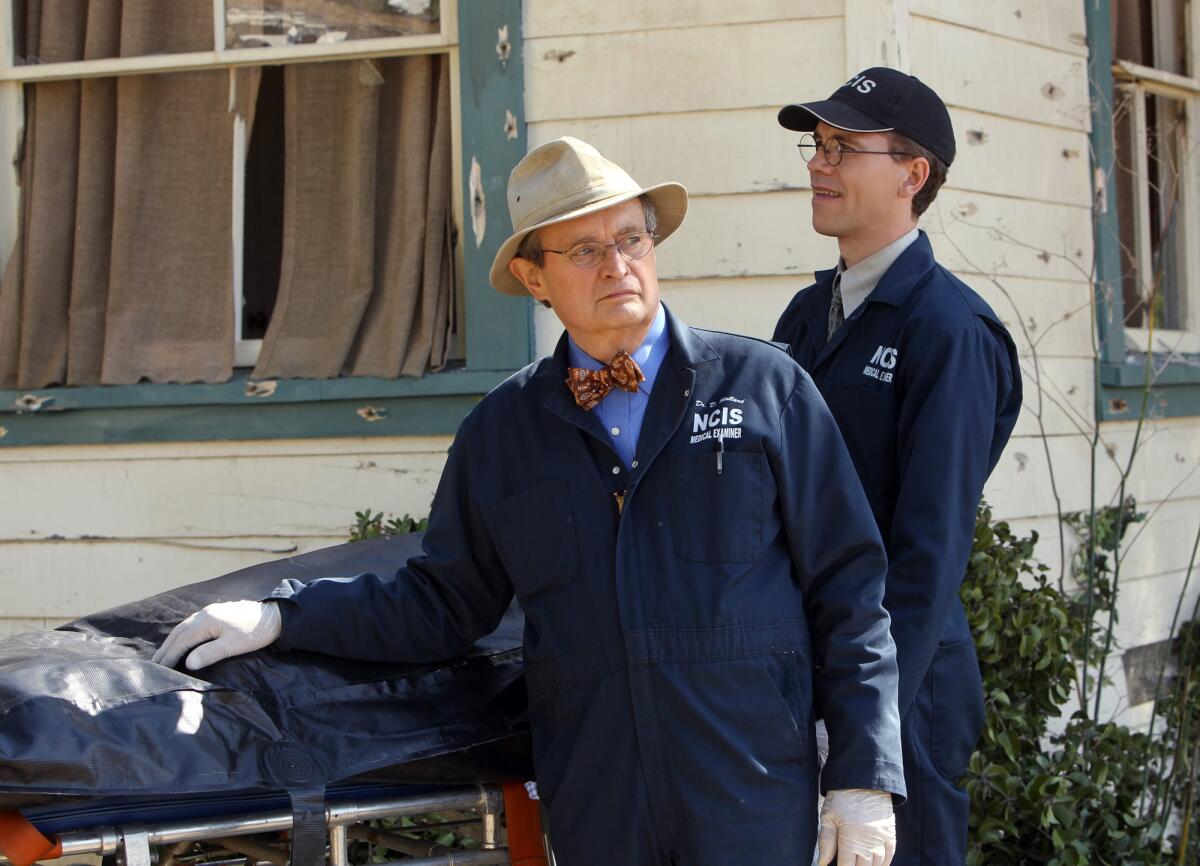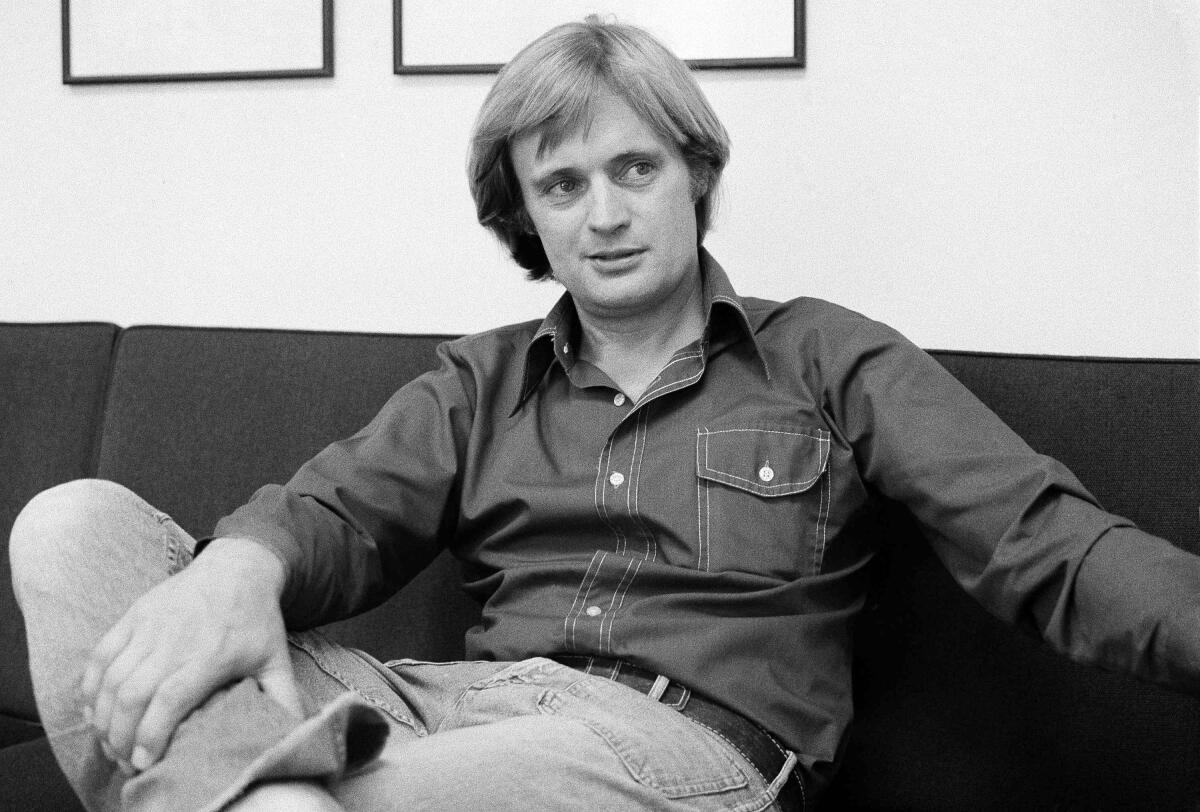Appreciation: From ‘U.N.C.L.E.’ to ‘NCIS,’ David McCallum made sidekicks the star

- Share via
Though Robert Vaughn was the initial star of the NBC espionage romp “The Man from U.N.C.L.E.,” which ran from 1964 into the dawn of 1968, leaving the world 105 episodes of varying seriousness and weirdness, David McCallum, who died Monday at the age of 90, played the spy I loved more.
It had something to do with my temperamental preference for sidekicks over alpha dogs, who, unencumbered by the weight of conventional heroism, were freer, funnier, more eccentric characters — actual characters. With his blond Beatle bob and iconic turtlenecks, McCallum’s Illya Kuryakin, a Russian working in the flush of the Cold War for an internationalist agency for good, seemed more of the moment, and indeterminately younger than Vaughn’s Americanized Bond, Napoleon Solo — though the actors were only a year apart and in their early 30s when the series began.
Where Solo embodied the twilight of a style, more Rat Pack than Fab Four, Illya intimated something fresh — he might have carried off a Nehru jacket, or beads — even if the series itself, like most things older generations create for younger, was something less than authentically hip. (Which is not to deny its cultural potency.) That McCallum was British — born in Scotland, raised in London — hit just the right note in the morning of Swinging London and the pop-musical, pop-cultural British Invasion. (Illya’s Russianness was laid lightly over his fundamental Britishness, and McCallum de-emphasized the accent as the series went on.)
Illya was soft-spoken, unflappable, ascetic, mysterious. “We’re never going to be specific about this character,” was his conception, as he later told an interviewer from the Television Academy Foundation. “He’s going to be an enigma all the way.” (Sharp-eyed viewers wondered about the wedding ring the character wore, which was only McCallum’s own, kept on at the request of his first wife, the actor Jill Ireland.) That McCallum recalled himself as “a young boy who was very much a loner, very much a reader of books,” feels right in tune with his screen presence.
“U.N.C.L.E.” had its phenomenal moment, and McCallum, who reportedly received more fan mail than any other actor in the history of its producing studio, MGM, was mobbed by crowds like a hot British pop musician. And he was, in fact, musical. In the series’ heyday, McCallum recorded four albums for Capitol, later sampled by the likes of Dr. Dre, John Legend and others, where he conducted instrumental arrangements of pop hits and some of his own compositions. (His parents were prominent classical musicians.) In one “U.N.C.L.E.” episode, “The Take Me to Your Leader Affair,” he plays guitar and duets with Nancy Sinatra on his own “Trouble”; in some corners, this would be considered even cooler now than it was at the time.

The series, episodes of which were expanded or combined and exported overseas as films, was revisited in a 1983 TV movie, “The Return of the Man from U.N.C.L.E.: The Fifteen Years Later Affair” and was rebooted in 2015 into a less than successful theatrical feature. But as successful as the show was in its time — and as meaningful as it remains to its legion of original fans and perhaps a few who encountered it posthumously — its impact pales next to that of “NCIS,” the CBS series on which McCallum worked for the entirety of its (so far) 20-year run. That show was at least once deemed the most-watched series in the world, with an audience numbering in the billions.
A quirky family comedy in the guise of a military police procedural, “NCIS” featured McCallum as medical examiner Dr. Donald “Ducky” Mallard — a job that in television typically requires a mix of equanimity and mordant wit, qualities for which the actor was naturally suited. (He did serious research for the part, including sitting in on autopsies.) With his bow tie, suspenders and spectacles, McCallum as Mallard may not have been the pinup of his swashbuckling youth — he’s more uncle here than man from U.N.C.L.E. — but he was a fan favorite right from the start, and a welcome presence to viewers who already loved him.
Ducky, after all, was not a million miles from Illya — soft-spoken, witty, impossible to rattle, cool, funny, warm or a little severe as the situation demanded. As in “U.N.C.L.E.,” McCallum played a seemingly secondary character who is absolutely essential to the narrative, as much as or more than his more melodramatically or physically active colleagues — the sidekick star.
Before and between those bookending successes — career-making and career-concluding — there were many other appearances, including the 1958 Titanic drama “A Night to Remember”; John Huston’s “Freud: The Secret Passion,” Peter Ustinov’s “Billy Budd” and John Sturges’ “The Great Escape”; a unique big-screen starring role in the 1968 “Sol Madrid”; lead parts in the 1970s British prisoner-of-war series “Colditz” and “Sapphire & Steel” (1979-1982), in which he and Joanna Lumley played inter-dimensional time agents; and guest shots in American series such as “Murder, She Wrote” and “Law & Order.”
Wherever he appeared, McCallum was always a reason to watch. For some of us, he was all the reason we needed.
More to Read
The complete guide to home viewing
Get Screen Gab for everything about the TV shows and streaming movies everyone’s talking about.
You may occasionally receive promotional content from the Los Angeles Times.







